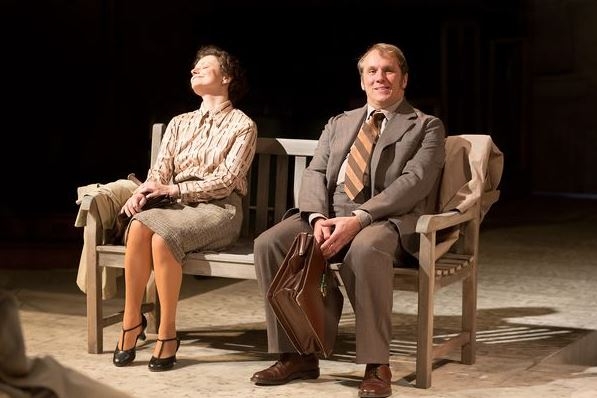That Day We Sang (Manchester)

© Jonathan Keenan
The Royal Exchange treats musicals like buses. Years go by without any then two show up in the same season. Victoria Wood’s That Day We Sang follows Sweeney Todd and is inspired by a true incident. In 1929 a choir of northern children overcame prejudices and made the remarkable achievement of performing at the Free Trade Hall and on record. A TV documentary about a late 1960’s reunion of the choir prompted Wood to devise a comedy of social embarrassment and a tentative and gentle love story.
After meeting at the reunion shy Tubby (Dean Andrews) and repressed Enid (Anna Francolini) endure grim dinners with the socially pretentious Frank and Dorothy Brierley (respectively James Quinn and Sally Bankes). As their romance grows the play cuts back to 1929 when the more spirited younger Tubby and his classmates are being taught to eliminate all trace of their northern accent prior to singing on the recording.
As you’d expect from one of our greatest comedians the play is hilarious with much of the humour coming from Wood’s attention to fine detail that resonates so strongly with the enthusiastic audience. It is impossible not to squirm as Wood brings back memories of how Berni Inns and mint Matchmakers were once considered the height of sophistication. Wood’s humour is mitigated by an edge of melancholy and even anger. There is a sense of regret at how the impulsiveness of youth decays into the caution of middle age. Wood subtly draws attention to social injustice- the shabby treatment of a war veteran who ends up as a doorman and the casual acceptance that northern children should be taught their accent is not good enough for public performance.
Dean Andrews enjoys the chance to stretch and slip away from his hard man TV image. He brings a halting sense of self-awareness and shy charm to Tubby whose recollection of the concert helps him appreciate the extent of his loneliness. Anna Francolini gives a conflicted performance of a woman hiding behind a brittle exterior but with strong flirtatious body language. All of the cast give excellent comic performances but Quinn and Bankes come close to stealing the show making the Brierleys a marvellous pair of grotesques. William Haresceugh, in his professional stage debut, makes a strong impression so that the cocky young Tubby offers a contrast with the older, rueful, version. .
Director Sarah Frankcom complements Wood’s wordplay with dazzling physical comedy and dance. The intimacy of the venue determines the nature of the latter. The Royal Exchange just isn’t big enough to stage the ‘Hooray for Hollywood’ style dance in Piccadilly Gardens envisaged in the script so choreographer Sammy Murray substitutes charm for spectacle. The desperation of the waiters in the Berni Inn is perfectly captured in a brusque, high stepping number in which the cast, wearing fixed smiles, move robotically. The comic highpoint is a fantasy sequence in which Francolini finally lets Enid’s repressed passions rip loose in an outrageous tango with her imagined lover.
That Day We Sang does not follow the conventional approach to musicals or seasonal entertainment. The songs comment upon, rather than drive forward, the narrative and the humour is probably best appreciated by the middle aged rather than the usual young target audience for festive shows. But it is a richly funny and moving play of the sort that is welcome in any season and by all age groups.
That Day We Sang continues at the Royal Exchange Theatre until 18 January.
– Dave Cunningham










